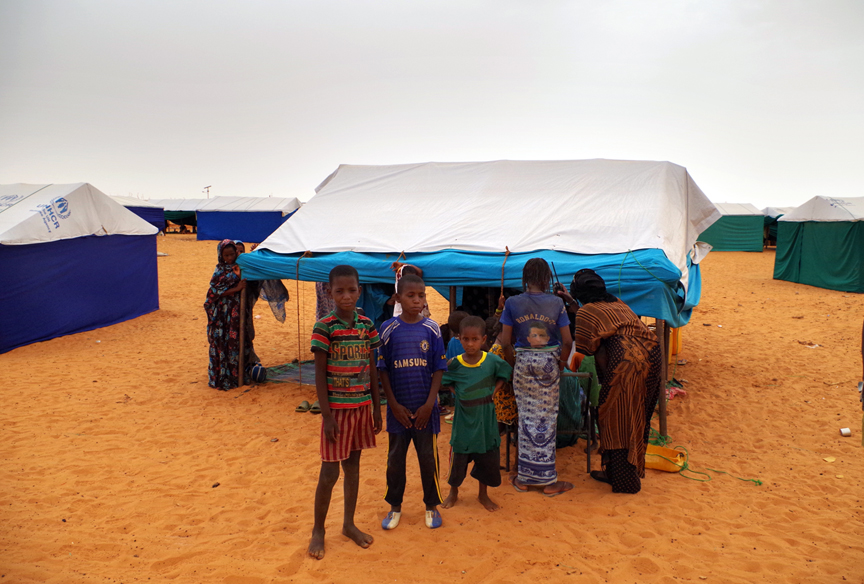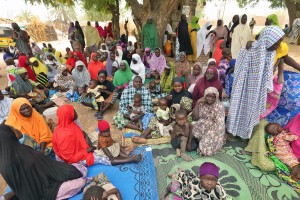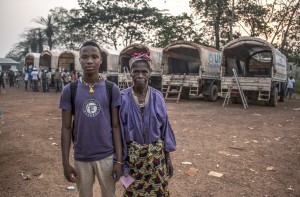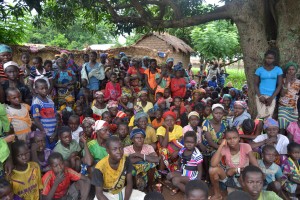Malian refugees continue to arrive in Mauritania
Almost 400 persons reached Mbera camp after fleeing renewed violence in the past weeks in northern Mali.
MBERA CAMP, MAURITANIA, 15 July 2015 (UNHCR) – After reaching 45 degrees celsius during the day, the temperature finally goes down in Mbera camp , located 50 kilometres from the Malian border, as the sun slowly begins to descend. Children start taking over the dusty streets, playing with wooden sticks and makeshift soccer balls. Aminata, in her late 20s, is the mother of three children. She now lives in the camp with her relatives in tented shelters recently set up to accommodate new arrivals from Mali. The colourful plastic sheeting of Aminata’s shelter serving as a wall has been rolled up to ease air circulation, thus providing an insight into a refugee family’s daily life in Mbera. The camp was built in June 2012 to host the Malian families who were fleeing the conflict between governmental forces and various rebel groups in the north of their country.
Aminata is one of the 400 Malians asylum-seekers who has recently arrived in Mauritania after fleeing renewed clashes among armed groups in northern Mali. Most of the refugees who have arrived in the past weeks originate from the Nampala area. “Fear led us to leave” says Aminata. ”We travelled to Fassala – which is the official entry point for Malian refugees into Mauritania – in a small truck with other families from the area”. Since the beginning of the conflict in Mali in 2012, inhabitants of Nampala and its surrounding areas have often been caught in crossfire between the regular Malian Army forces and armed groups. Lately, the situation has become even more tense, leading several families to leave their homes and find refuge in Mauritania.
Upon arriving at Fassala, Aminata and her family received assistance from the Mauritanian authorities who contacted UNHCR. After careful pre-screening of the population to identify individuals with specific needs, the agency arranged for their transportation to Mbera Camp. “In the camp, we received shelter, food, water, kitchen utensils and sleeping mats” says Aminata.

Makfoulim (left) did not inform anyone in her village, not even her parents, before fleeing to Mauritania to make sure that nobody would try to stop her and her family. The Malian woman fled with her four children to Mauritania. UNHCR / Sebastien Barrit Laroze
Makfoulim also recently arrived in the camp after fleeing from her village close to the city of Nampala, where a group of armed men entered several houses by force. She and her husband fled their home with their four children and Makfoulim’s brother. When asked why she decided to leave, Makfoulim gives the same answer as Aminata: “fear”. Makfoulim, her brother and her husband did not inform anyone in the village, not even their parents, before fleeing to Mauritania to make sure that nobody would try to stop them . In fact, the day they decided to leave, they told their family that they were going to the weekly market in Nampala. Once there, they paid someone the equivalent of USD 80 to drive them to Fassala, where they received assistance from the authorities. After their transfer to Mbera camp, Makfoulim’s five year-old son Mohamed fell severely ill, with intense vomiting. He was brought to the camp’s health center where he received treatment. “I am really grateful that aid agencies were able to help him” says Makfoulim, while Mohamed climbs up a bucket. “I feel safe here in Mbera but I cannot wait to return home. The day there is peace in Mali, I will return”.
With the recent arrivals from Mali, UNHCR and its partners carefully monitor the situation at the border to respond in time to new influxes. In the camp, almost 50,000 Malian refugees have access to key services such as education, health, water and sanitation, shelter and energy. They are provided with monthly food rations and relief items such as sleeping mats, buckets and kitchen utensils. In addition, UNHCR and its partners carry out various programmes such as vocational training and literacy classes, provide support to the refugees’ small businesses and facilitate access to gardening activities to strengthen their self-reliance.

Mbera camp hosts some 50,000 Malian refugees, including many children. UNHCR / Sebastien Barrit Laroze
Media contact in Mauritania: Sébastien Barrit Laroze, larozes@unhcr.org, +222 22 68 55 51
Le texte en français:Davantage de personnes fuient vers la Mauritanie afin d'échapper à l'insécurité qui règne dans le nord du Mali
Quelque 400 personnes ont rejoint le camp de Mbera après avoir fui des violences au cours des dernières semaines au Mali
MBERA CAMP, MAURITANIE, 15 juillet 2015 (UNHCR) - Près de 400 personnes fuyant une reprise de combats dans le nord du Mali ont trouvé refuge en Mauritanie au cours des derniers mois. La plupart de ces nouveaux arrivants demandeurs d'asile proviennent de la région de Nampala. Depuis le début du conflit en 2012, principalement entre les combattants touaregs du MNLA et les forces gouvernementales, les habitants de cette région sont souvent pris dans les tirs croisés. « La peur nous a amenés à partir », explique Aminata, une nouvelle arrivante. « Nous avons voyagé jusqu'à Fassala – qui est le principal point d'entrée des réfugiés maliens en Mauritanie – dans un petit camion avec d'autres familles de la région. »
A leur arrivé à Fassala, Aminata, une mère dans la fin de la vingtaine, et sa famille ont reçu de l'aide des autorités mauritaniennes, qui ont communiqué avec le HCR. Après une évaluation préliminaire de la population afin de détecter les personnes ayant des besoins particuliers, l'Agence des Nations Unies pour les réfugiés a organisé leur transport vers le camp Mbera. « Dans le camp, nous avons reçu un abri, de la nourriture, de l'eau, des ustensiles de cuisine et des matelas pour dormir », ajoute Aminata.
Une bonne partie du territoire du nord du Mali est revendiquée par différents groupes rebelles, mais elle est en fait sous le contrôle du MNLA (Mouvement national de libération de l'Azawad). Des groupes islamistes sont également actifs dans la région. Dernièrement, la région a connu une recrudescence des combats. Les chiffres du HCR montrent que le nombre de nouveaux arrivants depuis la fin du mois d'avril atteint maintenant 395. Il est possible que d'autres arrivants soient arrivés, mais qu'ils n'aient pas encore été enregistrés.
Le camp Mbera est situé à 50 km de la frontière malienne. Pendant le jour, les températures atteignent 45 degrés Celsius. Toutefois, lorsque le soleil commence lentement à descendre, les enfants prennent d'assaut les rues poussiéreuses afin de jouer avec des bâtons de bois et des ballons de soccer improvisés. Le camp, qui a été construit en juin 2012, constitue maintenant le domicile de près de 50 000 réfugiés maliens qui ont accès à des services clés, comme l'éducation, la santé, l'eau, l'assainissement, le logement et les services énergétiques.
Ils reçoivent chaque mois des rations de nourriture et des articles de secours, comme des matelas pour dormir, des seaux et des ustensiles de cuisine. En outre, le HCR et ses partenaires mettent en œuvre divers programmes, comme la formation professionnelle et les classes d'alphabétisation, afin de soutenir les petites entreprises des réfugiés et facilitent l'accès à des activités de jardinage afin de renforcer leur autonomie.


















